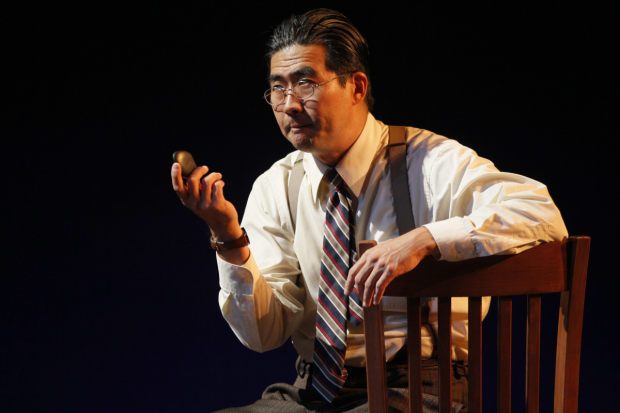All Men Are Not Created Equal in Hold These Truths
Arena Stage examines an often-ignored part of US history.

(© Chris Bennion)
The central premise of Hold These Truths — currently receiving an excellent Washington, DC, premiere at Arena Stage — is that race or ancestry must never be the cause for punishment.
Playwright Jeanne Sakata uses the true story of Gordon Hirabayashi to illuminate one of the most heinous stories in America's history. In 1941, driven by anger, fear, and desire for revenge for Pearl Harbor, the American government rounded up over 120,000 American citizens of Japanese descent and held them in detainment camps.
Hirabayashi was the son of immigrants and a young man in 1941, before Pearl Harbor. Sakata's story introduces her young hero as a carefree youth in the state of Washington, where he grew up on his parents' communal farm. The narrative moves quickly: Hirabayashi goes off to the University of Washington and begins campus life as a typical American student. But after Pearl Harbor, there is a curfew for Japanese students. Soon, people of Japanese descent are not welcome in certain restaurants or movie theaters in California. Hirabayashi can't get the job he wants because of the bias against the Japanese.
There is an eye-opening section early in the play where Hirabayashi and his friends go to New York City and are astonished to find no anti-Japanese feeling there. Hirabayashi can go into any museum he wants in New York as long as he has enough money. The trip is a revelation for him. But worse days are to come when Gordon and his friends return to California. They — and all their Japanese neighbors — have to sell their worldly goods and move into camps where their basic human needs are not met. Eventually, Gordon's parents are loaded onto trains and shipped to camps in southern California. Hirabayashi, however, refuses the government's order, claiming that it is unconstitutional. He is jailed and his case is eventually tried by the United States Supreme Court. It was not until Hirabayashi was considerably older that his case was reopened and his stance toward internment got the positive attention it deserved.
Ryun Yu is spectacular as Hirabayashi, whom Yu plays from the time he is a young man to when he is a gray-haired father of three children. Yu's subtle interpretation of Hirabayashi shows him to be an intelligent, profound, funny, and serious human being. Yu also plays all the many other characters who appeared in Hirabayashi's life, including his brothers, his parents, his girlfriend (later his wife), friends, judges, attorneys, and even a sheriff. These portraits are unique images of credible people, not caricatures. His depiction of Hirabayashi's scolding mother is particularly priceless.
Director Jessica Kubzansky keeps the pace of the show flowing easily, moving Yu quickly over Ben Zamora's pared-down set, which consists of a large, raised wooden platform, set in front of a vertical, light-colored square. Three wooden chairs are the only props Yu uses. Lighting designer Zamora occasionally uses the vertical square for displays of color, indicating events that have specific emotional resonance in the story. Cierra Coan costumes Hirabayashi in light brown slacks, a sweater or suit jacket at certain times of his life, and a clip-on tie or bow tie at other points.
Although it was first produced in 2007, Hold These Truths couldn't be more timely, when our government has issued an indefinite ban on refugees from Syria and a ban on immigrants from Muslim-majority countries. The play is particularly impactful as it shows its main character — from the time he was a boy memorizing the Constitution and the Declaration of Independence to the time he is an old man — refusing to give up "life, liberty and the pursuit of happiness."









